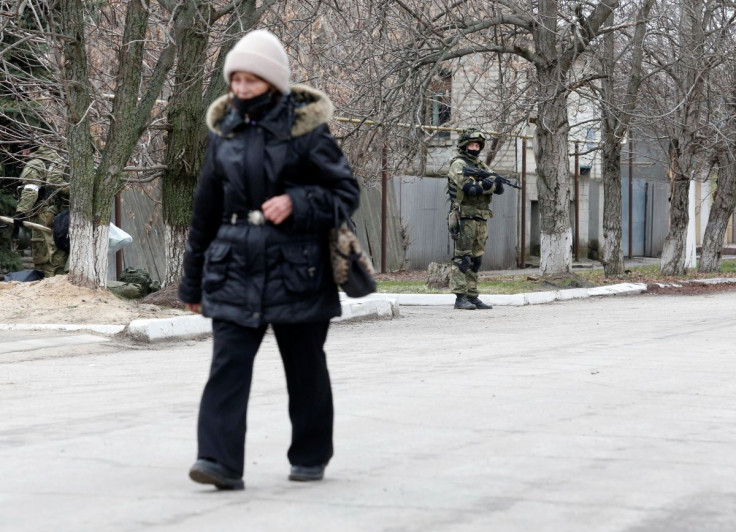Russian Soldiers Confiscate Phones Of Ukrainian Civilians, Check Them For 'Undesirable' Social Media Apps
KEY POINTS
- The Luhansk People's Republic ordered that citizens' phones be checked for "undesirable social networks," an official claims
- The LPR is also checking civilians' gadgets for exchanges with relatives living outside the separatist state
- Belongings can be seized for up to 30 days, while their owners may be detained for the same period
The mobile phones of Ukrainian civilians in Russian-occupied parts of Ukraine are getting inspected for "undesirable" social media apps and exchanges with people outside the area, Ukrainian officials claimed.
"The occupiers are taking away the phones of Ukrainian citizens in the occupied territories," Lyudmila Denisova, the commissioner for human rights of Ukraine's parliament, said in a statement.
The Luhansk People's Republic (LPR), an internationally unrecognized pro-Russian separatist state in Ukraine's Donbas region, has "issued an order to 'check' phones, tablets and other gadgets for the presence of 'undesirable' social networks and dialogues with relatives living outside the 'republic,'" according to Denisova.
Belongings can be seized for up to 30 days, while their owners may be detained for the same period, the official claimed.
Russia and the LPR are violating the requirements of Article 12 of the United Nations' Universal Declaration of Human Rights regarding non-interference with privacy, as well as Articles 18 and 19 of the Declaration, which guarantee freedom of thought, speech and access to information, according to Denisova.
"The occupying power restricts freedom of speech in the occupied territories and also isolates residents from any information other than racist propaganda," the human rights commissioner said in her statement.
Denisova has since called for the UN commission investigating human rights violations in Russia's invasion to "take into account these facts of human rights violations in Ukraine."
Russia's government has taken complete control of news and information to manage the public's view of the war, Deutsche Welle reported.
The country previously ranked 150 out of 180 countries in Reporters Without Borders' World Press Freedom Index due to a decade-long crackdown on independent media, but it dropped five more places in the latest index to 155, according to the German state-owned broadcaster.
Russian President Vladimir Putin has allegedly established extensive wartime censorship at a level not seen since the Soviet Union.
"Since Russia invaded Ukraine in February 2022, almost all independent media have been banned, blocked and/or declared ‘foreign agents.’ All others are subject to military censorship," the RSF's profile on Russia read.
"Although the internet connection rate is very high, almost two-thirds of Russians get their news mainly from television, which is controlled by the government, and from Russian social media such as VKontakte. Subjects such as homosexuality and religious feelings have gradually become off-limits for the media under Vladimir Putin, who has encouraged a certain conservatism in Russian society," the Paris-based campaign group said.
Around 90 media outlets and individuals have been labeled "foreign agents" and forced to shut down and/or flee Russia since 2017.

© Copyright IBTimes 2024. All rights reserved.





















